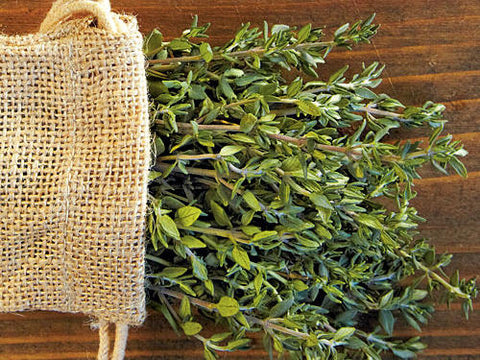Parts Used: Leaves and flowering tops
Medicinal Preparations: Culinary, tea, tincture, herbal steam, infused honey, vinegar, infused oil
Herbal Actions:
- Antimicrobial
- Carminative
- Diaphoretic
- Expectorant
- Antispasmodic
- Emmenagogue

Parts Used: Leaves and flowering tops
Medicinal Preparations: Culinary, tea, tincture, herbal steam, infused honey, vinegar, infused oil
Herbal Actions:
Medicinal and Culinary Uses: Thyme is one of my favorite culinary herbs and is highly revered in French, Italian, and other Mediterranean cuisines. It can be added to homemade herbes de provence blends or used on its own to flavor poultry, root vegetables, stews, sauces, and marinades. Experiment with thyme varieties—lemon thyme and orange thyme both impart a savory citrus flavor to dishes.
Like many mint-family herbs, thyme is stimulating to the digestive system—easing uncomfortable symptoms like gas and bloating. Its antimicrobial activity lends it to topical wound care and for fungal and yeast infections, and internally for digestive and respiratory infections.
Thyme is one of the first herbs I add to steam pots—it helps to relieve inflammation and break up congestion. Combined with its antispasmodic and expectorant properties, thyme is a traditional remedy for painful, hacking coughs, including conditions like whooping cough and bronchitis.
Cultivation: Thyme hails from the same Mediterranean soils as rosemary (Rosmarinus officinalis) and sage, and likewise prefers similar growing conditions. Namely: full sun, warm days, and well-drained soil. Be sure to add a generous helping of sand to your potting mix and let the soil dry out completely between waterings.
Harvest thyme in a “cut-and-come-again” style; simply give the plant a haircut early in the season and it will grow back lickety-split. If you enjoy the look of mixed plantings, consider pairing thyme in a pot with rosemary and strawberries (Fragaria spp.).
Safety and Contraindications: In high doses, thyme is an emmenagogue (stimulates uterine contractions and/or menstrual flow) and should be avoided in pregnancy. Culinary doses, lower in nature, are generally considered to be safe.
